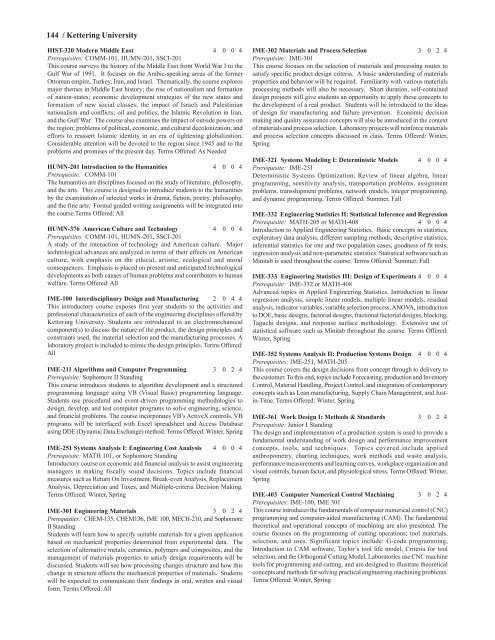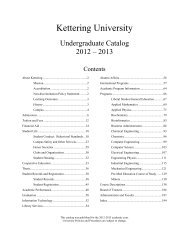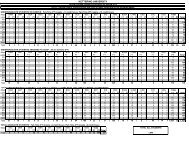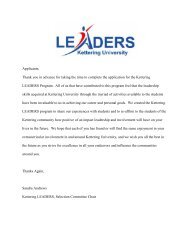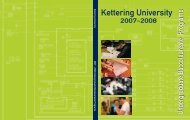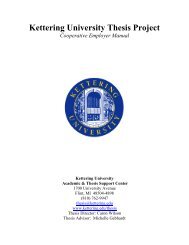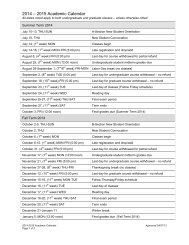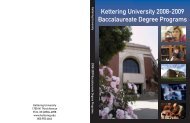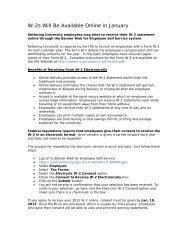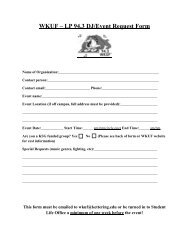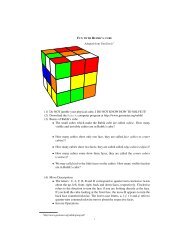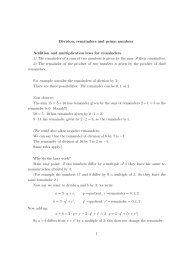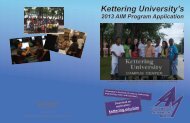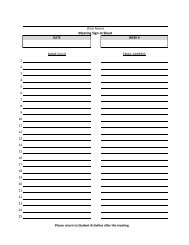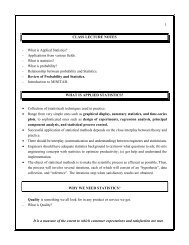2006-2007 Undergraduate Catalog - Kettering University
2006-2007 Undergraduate Catalog - Kettering University
2006-2007 Undergraduate Catalog - Kettering University
You also want an ePaper? Increase the reach of your titles
YUMPU automatically turns print PDFs into web optimized ePapers that Google loves.
Copyright & Disclaimer Information: Copyright © 1994, 1995, 1996, 1997, 1998, 1999, 2000, 2001, 2002, 2003, 2004, 2005, <strong>2006</strong>, <strong>2007</strong>. CollegeSource®, Inc. and Career Guidance Foundation. CollegeSource® digital catalogs are derivative works owned and copyrighted by CollegeSource®, Inc. and Career Guidance Foundation. <strong>Catalog</strong> content is owned and copyrighted by the appropriate school. While CollegeSource®, Inc. and Career Guidance Foundation provides information as a service to the public, copyright is retained on all digital catalogs.<br />
Copyright & Disclaimer Information: Copyright © 1994, 1995, 1996, 1997, 1998, 1999, 2000, 2001, 2002, 2003, 2004, 2005, <strong>2006</strong>, <strong>2007</strong>. CollegeSource®, Inc. and Career Guidance Foundation. CollegeSource® digital catalogs are derivative works owned and copyrighted by CollegeSource®, Inc. and Career Guidance Foundation. <strong>Catalog</strong> content is owned and copyrighted by the appropriate school. While CollegeSource®, Inc. and Career Guidance Foundation provides information as a service to the public, copyright is retained on all digital catalogs.<br />
144 / <strong>Kettering</strong> <strong>University</strong><br />
HIST-320 Modern Middle East 4 0 0 4<br />
Prerequisites: COMM-101, HUMN-201, SSCI-201<br />
This course surveys the history of the Middle East from World War I to the<br />
Gulf War of 1991. It focuses on the Arabic-speaking areas of the former<br />
Ottoman empire, Turkey, Iran, and Israel. Thematically, the course explores<br />
major themes in Middle East history; the rise of nationalism and formation<br />
of nation-states; economic development strategies of the new states and<br />
formation of new social classes; the impact of Israeli and Palestinian<br />
nationalism and conflicts; oil and politics; the Islamic Revolution in Iran,<br />
and the Gulf War. The course also examines the impact of outside powers on<br />
the region; problems of political, economic, and cultural decolonization; and<br />
efforts to reassert Islamic identity in an era of tightening globalization.<br />
Considerable attention will be devoted to the region since 1945 and to the<br />
problems and promises of the present day. Terms Offered: As Needed<br />
HUMN-201 Introduction to the Humanities 4 0 0 4<br />
Prerequisite: COMM-101<br />
The humanities are disciplines focused on the study of literature, philosophy,<br />
and the arts. This course is designed to introduce students to the humanities<br />
by the examination of selected works in drama, fiction, poetry, philosophy,<br />
and the fine arts. Formal graded writing assignments will be integrated into<br />
the course.Terms Offered: All<br />
HUMN-376 American Culture and Technology 4 0 0 4<br />
Prerequisites: COMM-101, HUMN-201, SSCI-201<br />
A study of the interaction of technology and American culture. Major<br />
technological advances are analyzed in terms of their effects on American<br />
culture, with emphasis on the ethical, artistic, ecological and moral<br />
consequences. Emphasis is placed on present and anticipated technological<br />
developments as both causes of human problems and contributors to human<br />
welfare. Terms Offered: All<br />
IME-100 Interdisciplinary Design and Manufacturing 2 0 4 4<br />
This introductory course exposes first year students to the activities and<br />
professional characteristics of each of the engineering disciplines offered by<br />
<strong>Kettering</strong> <strong>University</strong>. Students are introduced to an electromechanical<br />
component(s) to discuss the nature of the product, the design principles and<br />
constraints used, the material selection and the manufacturing processes. A<br />
laboratory project is included to mimic the design principles. Terms Offered:<br />
All<br />
IME-211 Algorithms and Computer Programming 3 0 2 4<br />
Prerequisite: Sophomore II Standing<br />
This course introduces students to algorithm development and a structured<br />
programming language using VB (Visual Basic) programming language.<br />
Students use procedural and event-driven programming methodologies to<br />
design, develop, and test computer programs to solve engineering, science,<br />
and financial problems. The course incorporates VB’s ActiveX controls. VB<br />
programs will be interfaced with Excel spreadsheet and Access Database<br />
using DDE (Dynamic Data Exchange) method. Terms Offered: Winter, Spring<br />
IME-251 Systems Analysis I: Engineering Cost Analysis 4 0 0 4<br />
Prerequisite: MATH 101, or Sophomore Standing<br />
Introductory course on economic and financial analysis to assist engineering<br />
managers in making fiscally sound decisions. Topics include financial<br />
measures such as Return On Investment, Break-even Analysis, Replacement<br />
Analysis, Depreciation and Taxes, and Multiple-criteria Decision Making.<br />
Terms Offered: Winter, Spring<br />
IME-301 Engineering Materials 3 0 2 4<br />
Prerequisites: CHEM-135, CHEM136, IME 100, MECH-210, and Sophomore<br />
II Standing<br />
Students will learn how to specify suitable materials for a given application<br />
based on mechanical properties determined from experimental data. The<br />
selection of alternative metals, ceramics, polymers and composites, and the<br />
management of materials properties to satisfy design requirements will be<br />
discussed. Students will see how processing changes structure and how this<br />
change in structure affects the mechanical properties of materials. Students<br />
will be expected to communicate their findings in oral, written and visual<br />
form. Terms Offered: All<br />
IME-302 Materials and Process Selection 3 0 2 4<br />
Prerequisite: IME-301<br />
This course focuses on the selection of materials and processing routes to<br />
satisfy specific product design criteria. A basic understanding of materials<br />
properties and behavior will be required. Familiarity with various materials<br />
processing methods will also be necessary. Short duration, self-contained<br />
design projects will give students an opportunity to apply these concepts to<br />
the development of a real product. Students will be introduced to the ideas<br />
of design for manufacturing and failure prevention. Economic decision<br />
making and quality assurance concepts will also be introduced in the context<br />
of materials and process selection. Laboratory projects will reinforce materials<br />
and process selection concepts discussed in class. Terms Offered: Winter,<br />
Spring<br />
IME-321 Systems Modeling I: Deterministic Models 4 0 0 4<br />
Prerequisite: IME-251<br />
Deterministic Systems Optimization; Review of linear algebra, linear<br />
programming, sensitivity analysis, transportation problems, assignment<br />
problems, transshipment problems, network models, integer programming,<br />
and dynamic programming. Terms Offered: Summer, Fall<br />
IME-332 Engineering Statistics II: Statistical Inference and Regression<br />
Prerequisite: MATH-205 or MATH-408 4 0 0 4<br />
Introduction to Applied Engineering Statistics. Basic concepts in statistics,<br />
exploratory data analysis, different sampling methods, descriptive statistics,<br />
inferential statistics for one and two population cases, goodness of fit tests,<br />
regression analysis and non-parametric statistics. Statistical software such as<br />
Minitab is used throughout the course. Terms Offered: Summer, Fall<br />
IME-333 Engineering Statistics III: Design of Experiments 4 0 0 4<br />
Prerequisite: IME-332 or MATH-408<br />
Advanced topics in Applied Engineering Statistics. Introduction to linear<br />
regression analysis, simple linear models, multiple linear models, residual<br />
analysis, indicator variables, variable selection process, ANOVA, introduction<br />
to DOE, basic designs, factorial designs, fractional factorial designs, blocking,<br />
Taguchi designs, and response surface methodology. Extensive use of<br />
statistical software such as Minitab throughout the course. Terms Offered:<br />
Winter, Spring<br />
IME-352 Systems Analysis II: Production Systems Design 4 0 0 4<br />
Prerequisites: IME-251, MATH-205<br />
This course covers the design decisions from concept through to delivery to<br />
the customer. To this end, topics include Forecasting, production and Inventory<br />
Control, Material Handling, Project Control, and integration of contemporary<br />
concepts such as Lean manufacturing, Supply Chain Management, and Justin-Time.<br />
Terms Offered: Winter, Spring<br />
IME-361 Work Design I: Methods & Standards 3 0 2 4<br />
Prerequisite: Junior I Standing<br />
The design and implementation of a production system is used to provide a<br />
fundamental understanding of work design and performance improvement<br />
concepts, tools, and techniques. Topics covered include applied<br />
anthropometry, charting techniques, work methods and waste analysis,<br />
performance measurements and learning curves, workplace organization and<br />
visual controls, human factor, and physiological stress. Terms Offered: Winter,<br />
Spring<br />
IME-403 Computer Numerical Control Machining 3 0 2 4<br />
Prerequisites: IME-100, IME 301<br />
This course introduces the fundamentals of computer numerical control (CNC)<br />
programming and computer-aided manufacturing (CAM). The fundamental<br />
theoretical and operational concepts of machining are also presented. The<br />
course focuses on the programming of cutting operations; tool materials,<br />
selection, and uses. Significant topics include: G-code programming,<br />
Introduction to CAM software, Taylor’s tool life model, Criteria for tool<br />
selection, and the Orthogonal Cutting Model. Laboratories use CNC machine<br />
tools for programming and cutting, and are designed to illustrate theoretical<br />
concepts and methods for solving practical engineering machining problems.<br />
Terms Offered: Winter, Spring


